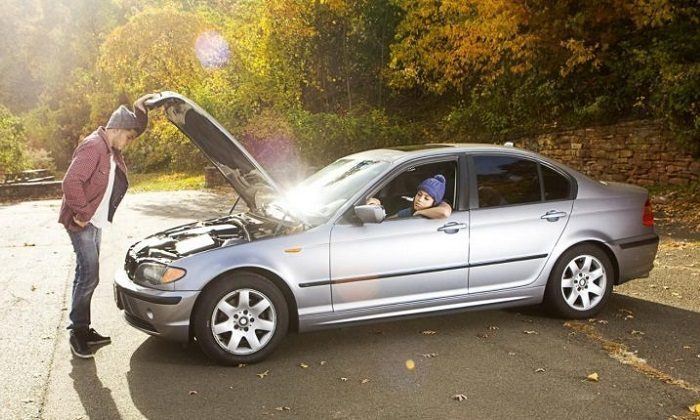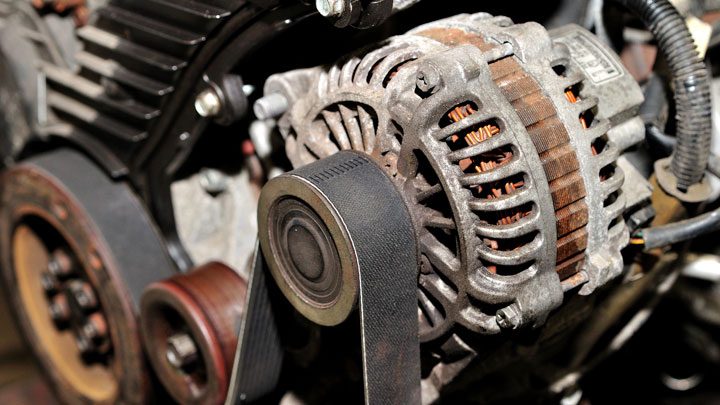by Joshua Thomas
Cars are highly complex machines with many components and moving parts, and this makes them prone to failing in different ways as any of these parts can stop working unexpectedly.
But, one of the most annoying fails, and what many motorists dread most is a car shutting off when driving. Besides being annoying, it can also put you in a dangerous situation given that it can happen anywhere even in the middle of a busy highway when driving at high speeds.
However, a car does not just shut off as there must be an underlying problem. Here we look at some of the most common causes of car shut-offs when driving, the possible solutions and also provide some handy tips to help prevent the problem.
Contents

Given the complexity of a car's design and performance, countless things can go wrong and lead to problems like the vehicle shutting off when driving. But, while each situation is different, the following are some of the most common causes of this issue.
Before you start overthinking that your vehicle has a huge mechanical or electrical failure because it shuts off unexpectedly, you should first check the fuel.
More often than not, the only reason your car will shut off when driving is that it has run out of fuel. Many motorists have a tendency to underestimate the amount of fuel they have in the vehicle and will in many instances overlook the gauge and assume they still have enough fuel in the tank.
In some instances, the fuel gauge will be stuck or faulty, and so it might not give you a correct indication of the fuel that you have and hence making it easy to run out of gas without realizing it.
Because your vehicle cannot run without fuel, when the gas runs out, it will shut off even when driving. And besides running out of gas, other issues like a frozen fuel line can also bring about this problem.
The battery is another crucial element for powering the vehicle as it is what delivers the power required to kick start the combustion process and also powers other electronic components in the vehicle.
When you have a dead battery, one of the issues you are likely to encounter is the car shutting off when driving because the battery will not be able to charge correctly, which means it can run out of power at any time.
But, note that in many cases if the battery can start the vehicle, it should also be good enough to keep it running. Hence, it will often only cause the vehicle to stop if something such as short-circuiting happens when driving.

An alternator is a component in your vehicle that is tasked with managing the supply of electricity to different components to keep it running smoothly.
When the vehicle shuts off as you drive, there is a high likelihood that you have a bad alternator which is affecting the supply of power.
If the alternator is bad, it may mean that the engine will lose power abruptly causing it to shut off when driving.
The good news is that the alternator will hardly fail unexpectedly because in many instances it goes bad gradually. If you are a keen motorist, you should be able to identify the problem long before it forces the car to shut off when driving.
The vehicle's engine requires a steady supply of fuel to provide continuous power to move the car. Hence, if the fuel supply is affected, the car can shut off when driving.
A faulty fuel pump is one of the main issues that can affect the supply of fuel to the engine. Hence, if you have a bad fuel pump, you are highly likely to experience engine shutoffs.
Sometimes it is not even the fuel pump that has issues but rather the fuel filter. But, regardless of the source of the problem, you need to have it fixed to ensure your vehicle keeps running smoothly.
If you are sure that your battery is in perfect working condition and other things like spark plugs and alternators are working well, the other possible explanation why your car can shut off when driving is a loose or faulty electrical cable.
Besides generating enough power, the vehicle also has to get it to all the important components which is what the cables are tasked with doing.
If the cables get loose or defective when driving, the vehicle may lose power in important parts and components, which can then result in an unexpected engine shut off as you drive.
The ignition system also plays a crucial role when it comes to supplying power to the vehicle. Hence, if any part or component in the system has a problem, one of the probable outcomes is the car shutting off as you drive.
A faulty ignition system can cause problems that start as soon as you switch on the vehicle such as weak combustion which eventually ends up switching off the car as you are driving.
Some of the possible problems with your ignition system that can cause this problem include a worn out ignition switch and faulty ignition relay.
Read More: Symptoms of Bad Ignition Coil
Modern vehicles have an engine control unit or simply ECU as one of the most crucial components in the vehicle as it is what controls most of the operations.
The ECU is a small computer tasked with ensuring everything in your vehicle runs smoothly and makes it easy to identify any problems.
If this car computer is not working properly, it can lead to power loss in the engine, which then causes the vehicle to shut off.
A check engine light will usually come on when you have any issues with the ECU or even other engine and vehicle problems causing the computer to malfunction.
Read More: How to Reset Check Engine Light
The usual reason why your car shuts off while driving is fuel starvation. When this happens, you will experience a lack of power within the vehicle and the engine RPMs might fluctuate more than usual. If you encounter fuel starvation, then there are 2 things that you can do: pull over or filter the air coming in.
If you don't notice any of the signs mentioned above, but your car still shuts off when driving, then it might be an issue with your transmission or brake pedal disengaging. This is when you should pull over and shut off the vehicle to avoid further damage.
The following steps are useful in case you have already pulled over and shut off the vehicle. These steps deal with diagnosing and fixing a car that shuts off when driving even if fuel starvation might not be the issue.
Start by removing the ignition key from the ignition switch. This will help ensure that no one inadvertently turns on the engine while you are working on it.
Once you have completed these steps and still haven't identified a problem, then it's time to consult a professional mechanic or take your vehicle to an authorized dealership service center.

With the probable causes of car shutting off when driving above in mind, you are one step close to solving the issue.
The other important thing that you need to know is how to deal with the problem. And while the right solution will depend on the specific cause, here are the best ways to deal with this common car problem.
Loose electrical cables are one of the easiest problems to fix in your vehicle, and you will hardly ever need to pay a mechanic to do it for you.
Hence, if you suspect that cables might be the reason your car shuts off when driving, you need to check and fix them.
Here you should start with the most obvious ones such as those coming from the battery and fuse box. And you only need to locate the loose cable and retighten it.
Also, check whether any of the cables have signs of permanent damage such as being broken. For such cases, the only alternative is to replace the cable.
If besides car shut off when driving you are also experiencing other issues such as loss of power and acceleration, chances are you have a problematic fuel pump and need to fix it.
The best way to deal with a bad fuel pump will be to replace it with a new one. For some experienced motorists, this should be an easy DIY project, but if you are not sure what to do, you should have a professional mechanic replace the fuel pump for you.
Read More: Symptoms and How to Test Fuel Pump
Motorists need to keep the battery and alternator connections clean at all times to ensure smooth functioning and prevent unexpected car shutoffs.
And you can easily tell when you have a faulty alternator from symptoms like the dashboard warning light coming on, flickering of the headlights, battery draining faster and rougher engine running.
You can easily fix the alternator or even replace it on your own if you know what to do or have it fixed for you during routine maintenance as it is quick and inexpensive.
The ECU is one of those vehicle components that you will not be able to fix on your own if it is misbehaving and causing the vehicle to shut off.
For the vehicle computer, the best you can do is an OBD 2 scanner to check whether the error codes you get will give you some idea on the specific issue and clear them to see if that makes any difference.
If you suspect that your ECU is misbehaving, you have no choice but to take the vehicle to a professional.
Sometimes just adding more fuel to your vehicle is all the fix you need to get it to start again. In many instances, the vehicle shuts off simply because it runs out of fuel.
But even as you refuel the car, you should also remember to check the fuel gauge and fix it if it has issues. The chances are that the only reason you run out of fuel is that the gauge did not give you an accurate indication of how much fuel you have left.
If you own a car that has electrical issues, eventually it will probably just turn off while your driving. And if the length of your trip is short enough that you can coast to safety or roll into a parking spot, then you're fine. However, if the length of your trip is too far for that and you end up stranded on the side of the road, then you might not be so fine.
It's a pretty good assumption that if your car is having electrical issues and keeps cutting off like this, it's probably going to do it again at some point. So what can you do about this? Well here are some helpful tips:
So if you use these suggestions and find that your car still cuts off while driving then the problem may be with the ignition system itself. You can try some starter fluid in the air intake below the throttle plate to see if this helps at all (it usually doesn't), but there is a more reliable way of attempting to diagnose ignition problems before turning on your hazards and coasting to a stop. This is actually something I have used before when my secondary ignition failed completely so I'm going to go over it with you guys.
Cars will not just shut off when driving as there is always an underlying issue whether it is a faulty fuel pump or alternator or you simply just run out of fuel without realizing it.
The first step in dealing with this annoying and quite dangerous problem is always to identify the cause. And if you are an experienced motorist, signs of the problem should be easy to spot as they will start to manifest long before the car shuts off unexpectedly.
The best way to deal with the problem once you identify the cause is to fix the underlying issue, and in many instances, you will not even need the services of a mechanic.
Lastly, the best way to deal with this problem is to prevent it through regular vehicle servicing and maintenance, and by practicing good driving habits.
Sources
 |
 |
 |
 |

About Joshua Thomas
Joshua Thomas just simply loves cars and willing to work on them whenever there's chance... sometimes for free.
He started CarCareTotal back in 2017 from the advices of total strangers who witnessed his amazing skills in car repairs here and there.
His goal with this creation is to help car owners better learn how to maintain and repair their cars; as such, the site would cover alot of areas: troubleshooting, product recommendations, tips & tricks.
Joshua received Bachelor of Science in Mechanical Engineering at San Diego State University.
Just Car Care